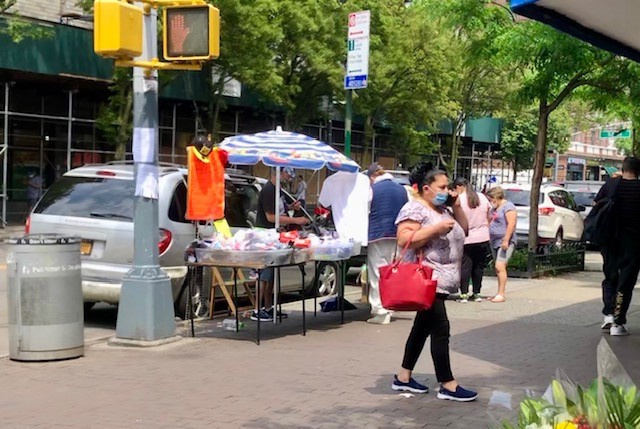
Street vendor in Jackson Heights June 2021 (Queens Post)
Jan. 24, 2022 By Max Parrot
Gov. Kathy Hochul plans to set aside $1 billion for small businesses in the next budget—but unlicensed street vendors are not eligible to get any of the funds.
Senator Jessica Ramos and Assemblymember Jessica González-Rojas said a bill they have introduced to reform the street vendor system would address the issue.
The legislation is aimed at quickly expanding the number of licensed vendors by removing a cap on street vendor permits in New York City. Obtaining a permit would bring vendors one step closer to getting state aid, the legislators said.
“We know what a lack of licenses can mean for the small business owners who are working to provide for their families and communities. People of color who are answering the call to build and create are penalized and overpoliced because they lack the recognition that a business license grants them,” said Ramos in a statement.
The proponents of the bill will have to contend with critics who argue street vendors block the sidewalks and compete with brick-and-mortar shops and restaurants, many of which are immigrant-owned as well.
The governor’s Executive Budget includes relief for small businesses in the form of tax credits designed to help them survive the pandemic. The state also launched a small business recovery grant program over the summer. Both forms of aid require a business license to participate.
The state legislation would go further than efforts that the city has made to reform the street vendor system over the pandemic.
Last summer the City Council passed legislation that will create 4,000 new street vendor permits over the next decade, but that program is set to expand gradually, opening an additional 400 licenses every year, starting this coming summer.
The legislators pointed out that because the number of licenses in New York City will continue to be limited for the near future, unlicensed street vendors may not be able to register their business in time to be eligible for the relief outlined in the governor’s budget.
In addition to eliminating the cap on the number of licenses, the bill would make it so that selling without a license was not a criminal offense. Last January, the city formally transferred the responsibility of street vendor inspections from the NYPD to the Department of Consumer and Worker Protection — a change that was celebrated by street vendors and advocates. The law would reduce the fines that unlicensed vendors would face from the DCWP as well as dismissing any remaining criminal prosecutions from before the agency took over enforcement.
Another proviso of the bill would ease restrictions on the hours and locations where vendors can operate. That’s not to say that the bill would eliminate all restrictions on vending, but it would create a standard that they need to stem from “objective health, safety, or welfare concerns.”
Mohamed Attia, managing director of the Street Vendor Project, explained that in the Mayor Giuliani-era a body called the Street Vendor Review Panel was in charge of implementing restrictions of vendors through a public complaint process. Vendors argued that the panel was overly sympathetic to the interests of big business and real estate. It created restrictions that were overly strict — many of which remain in effect, Attia added.
Vendors are not without critics in community organizations though. City Limits found that in the first nine months of 2021, the DCWP received over 4,000 complaints about street vending — many from business improvement districts, community boards and elected officials. But Attia insisted that the new standard would take a more balanced approach to restrictions that was focused on health and welfare concerns.
“It’s not gonna be based on some arbitrary requests from big businesses or real estate who have particular interests in making their areas or their blocks vendor-free,” he said.
González-Rojas pointed out that the New York State Black, Puerto Rican, Hispanic, and Asian Legislative Caucus supported the legislation in its 2022 People’s Budget.
“We need to pass A5081 to legalize street vending, bringing revenue back to our cities and state while honoring the valued contributions of immigrant entrepreneurs,” she said.
One Comment

The problem is that the street vendors do not pay rent, taxes, utilities or business fees that others need to pay. They are also not big on collecting or paying sales taxes. This leads to an unfair advantage.